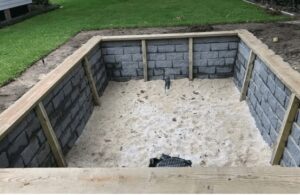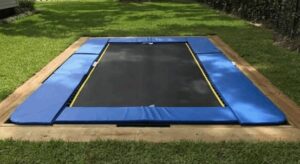Is the installation of an in-ground trampoline considered landscaping work, covered by a landscaper’s liability insurance policy?
Artificial intelligence programs suggest that it is. But human judges with the 11th U.S. Circuit Court of Appeals believe otherwise, despite one of the judges going to great lengths to explore A.I.’s views on the matter, according to an opinion handed down this week in an Alabama case, James Snell vs. United Specialty Insurance Co.
“The opinion is pretty thorough and straightforward. It really speaks for itself,” said Allen Graham, of Mobile, Alabama, one of the attorneys for United Specialty, a State National subsidiary.
Graham said this is the first time he has seen a judge employ ChatGPT or any other artificial intelligence program to examine the common usage or meaning of terms used in an insurance policy.
The appeal stemmed from an incident in Fairhope, Alabama. James Snell and his Outdoor Expressions landscaping company were asked by a longtime customer, the Westons, to install an in-ground trampoline. The work included digging a large pit in the yard, shoring up the sides with stone blocks and timber supports, and installing a drainage system. At ground level, just outside the edge trampoline, the crew capped the retaining wall with a 2×10-inch wood perimeter, flush with the grass.
In 2020, a girl jumping on the trampoline bounced and struck her face on the wood perimeter, causing serious injuries. The girl’s father filed suit against the homeowners, the trampoline manufacturer and Snell and his landscape company. The suit alleged the trampoline was defective and was installed without adequate padding or netting around it, as many trampolines have.
Snell held a commercial liability policy with United Specialty. The insurer denied the claim and informed Snell that it would not defend him in the lawsuit, noting that his policy covered only damages arising from landscaping work – not installation of a trampoline. Snell sued United, charging breach of contract and bad faith by the insurer.
The lower court, the U.S. District Court for Southern Alabama, in 2022 agreed with United Specialty and granted summary judgment. Snell appealed, and a panel of the 11th Circuit on May 28 upheld the district judge’s finding.

Snell, reached Wednesday by phone, said that the insurer’s denial and the court decisions were baffling to him, given that his landscaping crew had done extensive work on the land.
“That’s exactly what we did – a lot of landscaping,” he said.
He has since shied away from other trampoline projects, although his firm’s Facebook page still shows photos of the Weston job. Snell said and the photographs suggest that the injury may have been avoided if the padding around the trampoline’s frame had been extended to cover the wood deck board around it. Images of other in-ground installations around the country, found online, show grass up against the padding and the frame of the trampoline, without a wood cap.
Snell’s attorney, Thomas O’Hara, of Daphne, Alabama, could not be reached for comment Wednesday.

The 11th Circuit appellate panel explored the definition of “landscaping” as mentioned in Snell’s policy. But it did not decide the case on that question. Instead, the judges said the decision turned on Snell’s insurance application, which, according to Alabama law and a 2001 state Supreme Court decision, must be considered part of the policy.
The application asked if the work would include “any recreational or playground equipment construction or erection.” Snell had answered, “No.”
“If Snell had answered ‘Yes’ to that question or if he had informed United Specialty at some time later that his operations were going to include structural work for recreational equipment and the installation of recreational equipment, then United Specialty could have added that coverage and made any appropriate adjustments to Snell’s rate,” the lower court said in its decision.
The appellate judges upheld that reasoning, noting that “the insurance application conclusively shows he is not entitled to coverage.”
“We agree with the district court that Snell expressly disclaimed doing any of the sort of work he did here—including the site work necessary to install the trampoline that he now claims is ‘landscaping’ out of which the underlying injury ‘arises,'” Judge Elizabeth Branch wrote for the three-judge appeals court panel.
The opinion held other guideposts for insurers writing liability coverage: Alabama law, contrary to what Snell’s lawyer argued, does not require a judgment on whether the insurer had a duty to indemnify before a decision is made on a duty to defend, the 11th Circuit panel said. And the bad-faith claim failed because United Specialty had a lawful basis for denying the claim and Snell did not show that United had neglected to fully investigate.
Also, the landscaper’s insurance policy indicated that the exclusion of non-landscape work was not actually an exclusion to the policy but was a limitation of coverage. That was an important distinction, the court said, because Alabama law notes that the insured has the burden of proof to show that coverage exists but the insurer must prove that an exclusion applies.
Still, the underlying question of whether installing an in-ground trampoline is considered landscaping work nagged at one of the judges, Kevin Newsom. Although the court’s opinion sidestepped that question a bit, thanks to the state law requiring that the insurance application form be considered part of the policy, other cases will undoubtedly focus on the ordinary meaning of terms, such as “landscaping.”
In a 25-page concurring but thought-provoking opinion, Newsom said his efforts to determine the true meaning of the word left him a little frustrated. So he put the question to OpenAI’s ChatGPT, and Google’s A.I. platform. His exercise came as insurers have begun to adopt artificial intelligence in a number of roles, but courts around the country have disciplined lawyers for relying too heavily on A.I. to write their arguments, some of which have cited nonexistent court decisions.
Newsom, an Alabama native who has been outspoken on some other issues, acknowledged that it first sounded “absurd” to consult with A.I. large-language-model tools, but the more he researched it, the more viable it seemed.
“Yes, installing an in-ground trampoline can be considered a part of landscaping,” ChatGPT answered, Newsom explained. “Landscaping involves altering the visible features of an outdoor area for aesthetic or practical purposes, and adding an in-ground trampoline would modify the appearance and function of the space.”
Google’s Bard, the forerunner to GoogleGemini A.I., produced a more nuanced response, noting that the answer depends on whether “landscaping” is defined broadly or narrowly. Under a broad definition of “any modification to the visible features of an area of land,” then, yes, that includes the trampoline work. But under the more narrow definition of planting and maintaining vegetation, it would not.
“Ultimately, whether or not installing an in-ground trampoline is considered landscaping is a matter of opinion. There is no right or wrong answer,” Bard A.I. concluded.
Newsom, age 51, who was appointed to the bench in 2017 by then-President Donald Trump, concluded that his exercise shows that A.I. should at least be a tool in the judiciary’s toolbox, going forward. A.I. platforms have their drawbacks, he said, but they are transparent and comb through billions of words and weigh multiple references— from academic to the commonplace—that human judges don’t have the bandwidth for.
“Plenty of questions remain,” Newsom wrote. “But—and this is my bottom line—I think that LLMs (large language models) have promise. At the very least, it no longer strikes me as ridiculous to think that an LLM like ChatGPT might have something useful to say about the common, everyday meaning of the words and phrases used in legal texts.”
The full appeals court opinion can be seen here. Newsom’s concurring opinion starts at page 25.
This article was originally published by Insurance Journal. Reporter Will Rabb is the Southeast Editor of Insurance Journal.





















 Lessons From 25 Years Leading Accident & Health at Crum & Forster
Lessons From 25 Years Leading Accident & Health at Crum & Forster  Retired NASCAR Driver Greg Biffle Wasn’t Piloting Plane Before Deadly Crash
Retired NASCAR Driver Greg Biffle Wasn’t Piloting Plane Before Deadly Crash  Chubb CEO Greenberg on Personal Insurance Affordability and Data Centers
Chubb CEO Greenberg on Personal Insurance Affordability and Data Centers  How Americans Are Using AI at Work: Gallup Poll
How Americans Are Using AI at Work: Gallup Poll 




